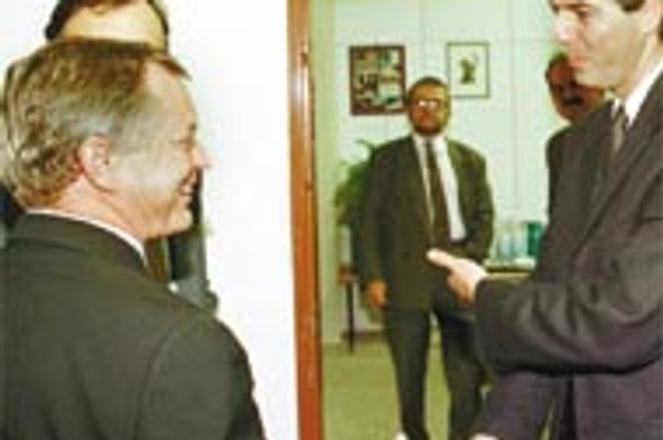Forced smile. Jozef Migaš (left), leader of the reformed communist SDĽ party, extends a hand to Hungarian party leader Bela Bugár.TASR
Signs of division and disagreement are already beginning to show among the four former opposition parties which took almost 60% of the vote in September's elections. The most serious tensions have been created by the reformed communist Party of the Democratic Left, which has said it does not want the Hungarian party to be a part of the new government.
Robert Fico, a deputy with the Democratic Left (SDĽ) party, said on October 5 that "the SDĽ is interested in creating a strong government for four years, but the coalition of four parties including the Hungarian contains more problems than advantages." Fico's words echoed the statement of SDĽ leader Jozef Migaš on October 2, in which he said that "the optimal solution would be the creation of a government of three political parties."
Hungarian politicians responded angrily that any government that did not include them could not expect their support in Parliament. "If we are not in the government, then we are going to be a strong opposition to the ruling parties," said Hungarian Party (SMK) chairman Bela Bugar on October 5.
The dispute shook the fragile unity of the four former opposition parties, which had announced less than 24 hours after polls closed that they intended to form a government together. Political analysts and Hungarian politicians accused the SDĽ of using the Hungarian issue in maneuvering to secure more seats for its members in the new cabinet.
"A four-party coalition narrows the area for the SDĽ in its left-wing policies," said Bugar. "In such a government, the SDĽ would not just have less weight in the ruling coalition, but also fewer cabinet positions. That is the point, nothing else."
Miroslav Kusý, a political science professor at Bratislava's Comenius University, agreed with Bugar's evaluation. "It's a fight for seats," he said. "We will see this kind of maneuvering going on until the government is consolidated."
But SDĽ deputies insisted that their opposition to the participation of Hungarians in the government was genuine, and cited as the main stumbling blocks the Beneš Decrees, issued after World War II, and the Hungarian party's stance on the controversial Gabčíkovo-Nagymaros hydro dam dispute.
The decrees, issued in 1945 by the Czechoslovak president Eduard Beneš, caused approximately 40,000 to 60,000 Hungarians to be deported from Slovakia either to Hungary or to the Czech Republic. The decrees, which applied to Hungarians, Germans and to "all enemies of the Czech and Slovak people," are still valid, but have not been used since the end of the war.
The Hungarian party has always lobbied for the withdrawal of the decrees, saying that at the very least they legalized discrimination against minorities. But SDĽ deputies said they were tired of discussing the matter, and warned the public that having the Hungarians in government would mean opening up the decrees for inspection. "I would rather have fewer votes in Parliament than have them remind us of the Beneš Decrees all the time,'' said Fico.
But Bugar compared the SDĽ's tactics to "the methods of [Nazi propaganda chief Jozef] Goebbels," and said that his party had not brought up the Beneš decrees at the negotiating table.
Throughout the dispute, the other two opposition parties - the SDK, which came second in elections, and the SOP, which was the smallest party to enter Parliament - have remained on the sidelines, saying only that they supported a coalition government that included the Hungarian Party. "We are interested in a wide coalition government," reiterated SDK leader Mikuláš Dzurinda on October 6.
If the four opposition parties are able to form a coalition, they would hold 93 out of 150 parliamentary seats, which wouldgive them enough power to amend the constitution.
Without the Hungarians , however, the government would have only 78 seats, barely enough to pass laws of any kind.
The friction between the fromer communists and the Hungarians drew swift reactions from other corners of Slovakia's political stage. Parliamentary Chairman Ivan Gašparovič, who is also a deputy for the ruling HZDS party of Premier Vladimír Mečiar, said the dispute was a signal that the HZDS could still form a government with disaffected opposition parties.
The Helsinki Civic Assembly in Slovakia, on the other hand, called the SDĽ's demands for a three party coalition "anti-civic and anti-democratic" and insulting towards minorities. The Association for the Republic appealed to the former opposition parties not to disappoint the voters who had trusted them.
Amidst all the flap, the SDĽ recanted slightly its earlier position on October 6. Following several hours of negotiations between SDĽ and Hungarian party representatives, the parties issued a short joint statement to the effect that "the Party of the Democratic Left and the Hungarian Coalition Party expressed their will to continue with negotiations about creating a united government."
SDĽ spokesman Ľubomir Andrassy said on October 7 that "the three party government would still be better for the SDĽ, but we are prepared for compromise if the SMK will give us its concrete positions on the Beneš Decrees and Gabčíkovo. But we are not nationalists, and we are not trying to attract voters from the [far-right] Slovak National Party or any other party."
Additional reporting by Ivan Remiaš


